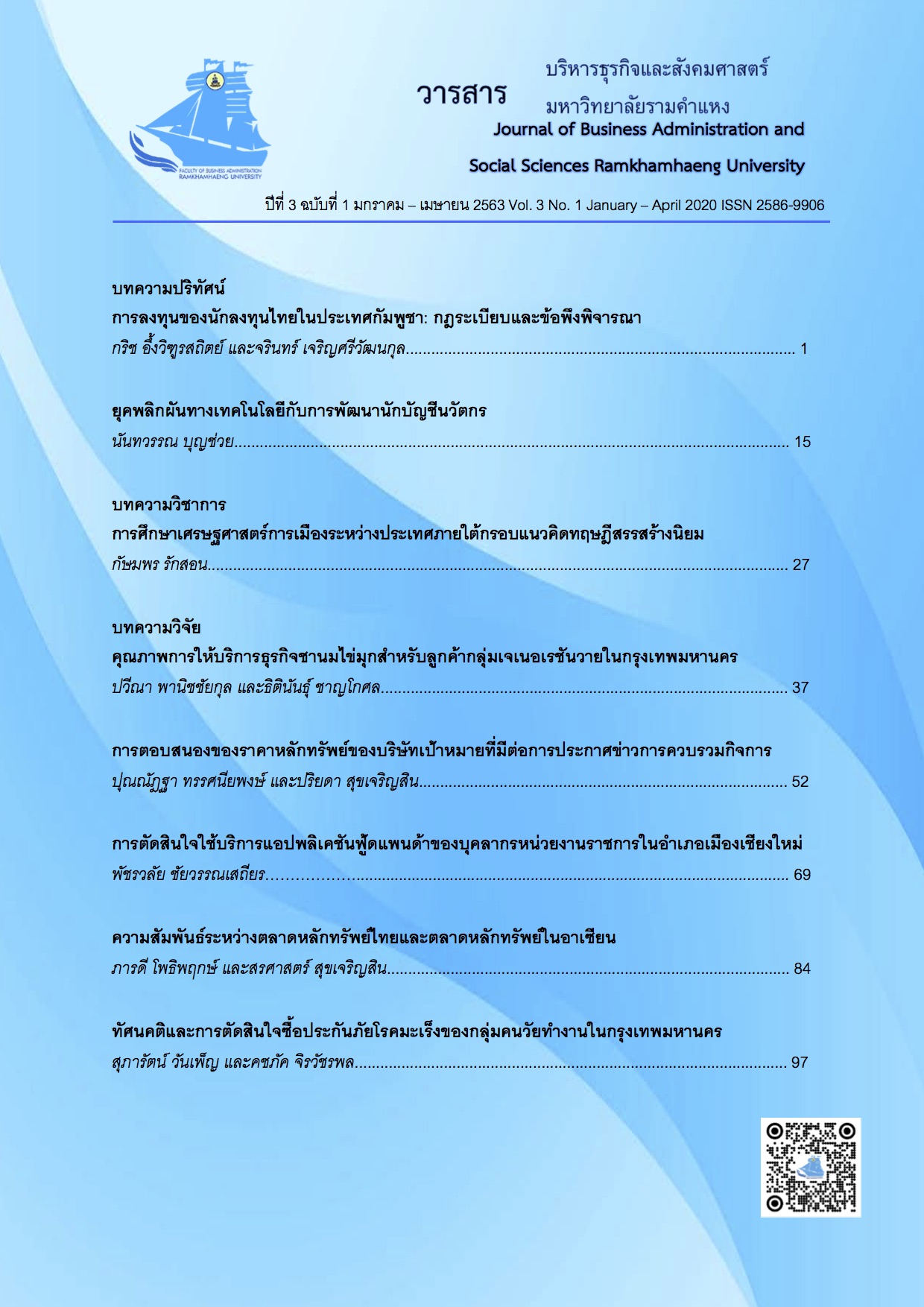The Age of Disruptive Technology and the Development of Innovative Accountants
Main Article Content
Abstract
Accountants, if adhering to the framework of traditional work standards, may be challenged by the influence of digital technology i.e. artificial intelligence (AI). In the near future, Blockchain technology will be adapted to accounting procedures which will decrease mistakes, costs, time and corruption and will simultaneously maximize security. These issues lead to questions as to whether accounting personnel in organizations will be replaced by AI technology and, if so, at what level. AI will only replace accounting work that has clear standards of operating procedures such as paperwork. In relation to data analysis, it is necessary to have accountants with the high level of skills needed to retrieve all organizational data for analysis in order to provide the data necessary to support and guide the decisions of executives.
Therefore, accountants in the age of disruptive technology must develop new skills, reskill and strengthen existing skills by upskilling. In addition, modern accountants must have the partnership skills required to be strategic partners with business owners by having a deep understanding of the changing nature of businesses and markets. Modern accountants must apply analytic tools and technologies such as robotic process automation in order to increase efficiency in accounting work at the level of value promotion, cost reduction, and the maximum efficiency of work procedures in order to create innovations. All of these factors combined define the role of “innovative accountants.”
Article Details
เนื้อหาและข้อมูลในบทความที่ลงตีพิมพ์ในวารสารบริหารธุรกิจและสังคมศาสตร์ มหาวิทยาลัยรามคำแหง ถือเป็นข้อคิดเห็นและความรับผิดชอบของผู้เขียนบทความโดยตรง ซึ่งกองบรรณาธิการไม่จำเป็นต้องเห็นด้วย หรือร่วมรับผิดชอบใดๆ
บทความ ข้อมูล เนื้อหา รูปภาพ ฯลฯ ที่ได้รับการตีพิมพ์ในวารสารบริหารธุรกิจและสังคมศาสตร์ มหาวิทยาลัยรามคำแหง ถือเป็นลิขสิทธิ์ของวารสารบริหารธุรกิจและสังคมศาสตร์ มหาวิทยาลัยรามคำแหง หากบุคคลหรือหน่วยงานใดต้องการนำบทความทั้งหมดหรือส่วนหนึ่งส่วนใดไปเผยแพร่ต่อ หรือเพื่อกระทำการใดๆ จะต้องได้รับอนุญาตเป็นลายลักษณ์อักษรจากวารสารบริหารธุรกิจและสังคมศาสตร์ มหาวิทยาลัยรามคำแหง ก่อนเท่านั้น
References
กมลภู สันทะจักร และกนกศักดิ์ สุขวัฒนาสินิทธิ์. (2561). คุณลักษณะนักบัญชีที่พึงประสงค์ในยุคไทยแลนด์ 4.0 ของหน่วยงานราชการในประเทศไทย. วารสารมหาจุฬานาครทรรศน์, 5(3), 771-790.
กองกำกับบัญชีธุรกิจ. (2562). ก้าวทันมิติใหม่การบัญชียุคดิจิทัล กรมพัฒน์ฯ เร่งเสริมแกร่งผู้ประกอบธุรกิจสำนักงานบัญชี...รับการเปลี่ยนแปลง (ฉบับที่ 51). สืบค้นเมื่อ 27 กุมภาพันธ์ 2562, จาก https://www.dbd.go.th/news_view.php?nid=469414025
“รับมืออย่างรู้ทัน แรงงานยุคดิจิทัล”. (2563). งานสัมมนา "Digital Workforce Automation Seminar 2017 [เอกสารประกอบการสัมมนา]. สืบค้นเมื่อ 10 เมษายน 2563, จาก https://www.pwc.com/th/en/pwc-thailand-blogs/blog-20171130.html
วิไลพร ทวีลาภพันทอง. (2563). ก้าวไปข้างหน้ากับ “ระบบอัตโนมัติ” รับมือตลาดแรงงานดิจิทัล. สืบค้นเมื่อ 10 เมษายน 2563, จาก https://www.pwc.com/th/en/pwc-thailand-blogs/blog-20171130.html
ศิรประภา ศรีวิโรจน์ และกนกวรรณ เอี่ยมชื่น. (2562). นักบัญชี ในยุค 4.0. วารสารวิชาการมหาวิทยาลัยอีสเทิร์นเอเชีย ฉบับสังคมศาสตร์และมนุษยศาสตร์, 9(1), 19-28.
ศิริรัฐ โชติเวชการ. (พฤษภาคม, 2561ก). พัฒนาการของระบบบัญชีคอมพิวเตอร์ที่น่าจับตามอง. จดหมายข่าวสภาวิชาชีพบัญชีในพระบรมราชูปถัมป์, 65, 24-25.
ศิริรัฐ โชติเวชการ. (พฤษภาคม, 2561ข). Cloud-based Accounting Software. จดหมายข่าวสภาวิชาชีพบัญชีในพระบรมราชูปถัมป์, 66, 16-17.
ศิริรัฐ โชติเวชการ. (พฤษภาคม, 2561ค). Mobile Accounting. จดหมายข่าวสภาวิชาชีพบัญชีในพระบรม
ราชูปถัมป์, 67, 8-9.
ศิริรัฐ โชติเวชการ. (พฤษภาคม, 2561ง). การใช้ประโยชน์ของ Artificial Intelligence (AI) ในงานบัญชี. จดหมายข่าวสภาวิชาชีพบัญชีในพระบรมราชูปถัมป์, 68, 12-13.
ศิริรัฐ โชติเวชการ. (พฤษภาคม, 2561จ). การใช้ประโยชน์จาก OCR ในวงการบัญชี. จดหมายข่าวสภาวิชาชีพบัญชีในพระบรมราชูปถัมป์, 69, 15-17.
สภาวิชาชีพบัญชี. (2560). Digital Economy: Impact on Accounting Professions. เอกสารประกอบคำบรรยาย การประชุมวิชาการ “FAP International Conference 2016”, จัดขึ้นโดย สภาวิชาชีพบัญชี, 21 ตุลาคม 2559.
อมรา ติรศรีวัฒน์. (2561). การบัญชีดิจิทัลและการเตรียมความพร้อมในการเรียนการสอนนักศึกษา ในยุคเศรษฐกิจดิจิทัล. การประชุมวิชาการและนำเสนอผลงานวิชาการระดับชาติ UTCC Academic Day ครั้งที่ 2, 8 มิถุนายน 2561, มหาวิทยาลัยหอการค้าไทย, กรุงเทพฯ.
Blockchain Review. (2563). บล็อกเชน (Blockchain) จะเปิดม่านยุคใหม่แห่งอุตสาหกรรมบัญชี. สืบค้นเมื่อ 29 กุมภาพันธ์ 2563, จาก https://blockchain-review.co.th/ blockchain-review/blockchain-accounting/
Bottom Line. (2563). รีสกีล (Reskill) ทางรอดคนทำงานยุคดิจิทัล. สืบค้นเมื่อ 10 เมษายน 2563, จาก https://bottomlineis.co/Business_Work_Career_Reskill_Corporate
Davern, M., & Pinnuck, M. (2005). The pervasiveness of information and communication technology: Its effects on business models and implications for the accounting profession. Australian Accounting Review, 15(3), 39-43.
JobDST. (2017). Adjusting the Thinking Angle to be Digital Accountant. Retrieved February 28, 2020, from http://www.jobdst.com/index.php?option=com_content&view=article&id=494Itemid=136
Mäkinen, H. (2010). The Factors Impacting the Diffusion of Innovation in Digitalising Accounting. Retrieved February 26, 2020, from https://aaltodoc.aalto.fi/bitstream/handle/123456789/423/hse_ethesis_12291.pdf? sequence=1&isAllowed=y


